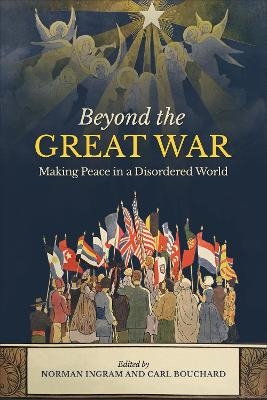
Beyond the Great War
University of Toronto Press (Verlag)
978-1-4875-4274-0 (ISBN)
Following the end of the First World War, a new world order emerged from the Paris Peace Conference of 1919. It was an order riddled with contradictions and problems that were only finally resolved after the Second World War.
Beyond the Great War brings together a group of both well-established and younger historians who share a rejection of the dominant view of the peace process that ended the First World War. The book expands beyond the traditional focus on diplomatic and high political history to question the assumption that the Paris Peace Treaties were the progenitors of a new world order. Extending the ongoing debate about the success of the Treaty of Versailles and surrounding events, this collection approaches the heritage of the Great War through a variety of lenses: gender, race, the high politics of diplomacy, the peace movement, provision for veterans, international science, socialism, and the way the war ended. Collectively, contributors argue that the treaties were at best a mitigated success, and that the "brave new world" of 1919 cannot be separated from the Great War that preceded it.
Carl Bouchard is a professor of Modern History and International Relations at the Université de Montréal. Norman Ingram is a professor of Modern French History at Concordia University.
1. 1914 or 1919? The Aetiology of a Disordered World
Norman Ingram and Carl Bouchard
Part One: Internationalism and Political Disorder
2. The Great War and the Political Conditions of Internationalism
Peter Jackson and William Mulligan
3. Setting Out on a Long Irenic Campaign: The Carnegie Endowment for International Peace Prepares the Construction of a Peaceful World Order, 1910–1920
Andrew Barros
4. European Socialists, the Vienna Union, and the International Political Order after the First World War
Talbot Imlay
Part Two: Between Order and Disorder: The Case of France
5. Historical Dissent and the Contested Peace of 1919 in France
Norman Ingram
6. Not So Republican After All? The Ambiguous End of the Great War in Alsace-Lorraine, 1918–1919
Sebastian Döderlein
7. The “Right to Reparations”: A Legal Concept in Postwar France
Bruno Cabanes
8. The Wilsonians: When the Traditional Order Creates Disorder, 1918–1919
Carl Bouchard
Part Three: Science, Gender, and Race in a Disordered Postwar World
9. “Building for Peace”: American Chemist William Noyes behind Reconciliation Efforts, 1919–1924
Marie-Eve Chagnon
10. So That Our Sons Have Not Died in Vain: Calls for Peace from Pacifist and Non-pacifist Mothers after the Great War
Marie-Michèle Doucet
11. “No Women of the World Hate War and Seek Peace More than the Colored Women”: Mary Church Terrell’s Bid for Racial Justice and Women’s Rights in 1919
Mona Siegel
| Erscheinungsdatum | 13.01.2022 |
|---|---|
| Zusatzinfo | 2 b&w illustrations |
| Verlagsort | Toronto |
| Sprache | englisch |
| Maße | 155 x 234 mm |
| Gewicht | 500 g |
| Themenwelt | Geschichte ► Allgemeine Geschichte ► Neuzeit (bis 1918) |
| Geschichte ► Allgemeine Geschichte ► Zeitgeschichte | |
| Sozialwissenschaften ► Politik / Verwaltung | |
| ISBN-10 | 1-4875-4274-7 / 1487542747 |
| ISBN-13 | 978-1-4875-4274-0 / 9781487542740 |
| Zustand | Neuware |
| Haben Sie eine Frage zum Produkt? |
aus dem Bereich


